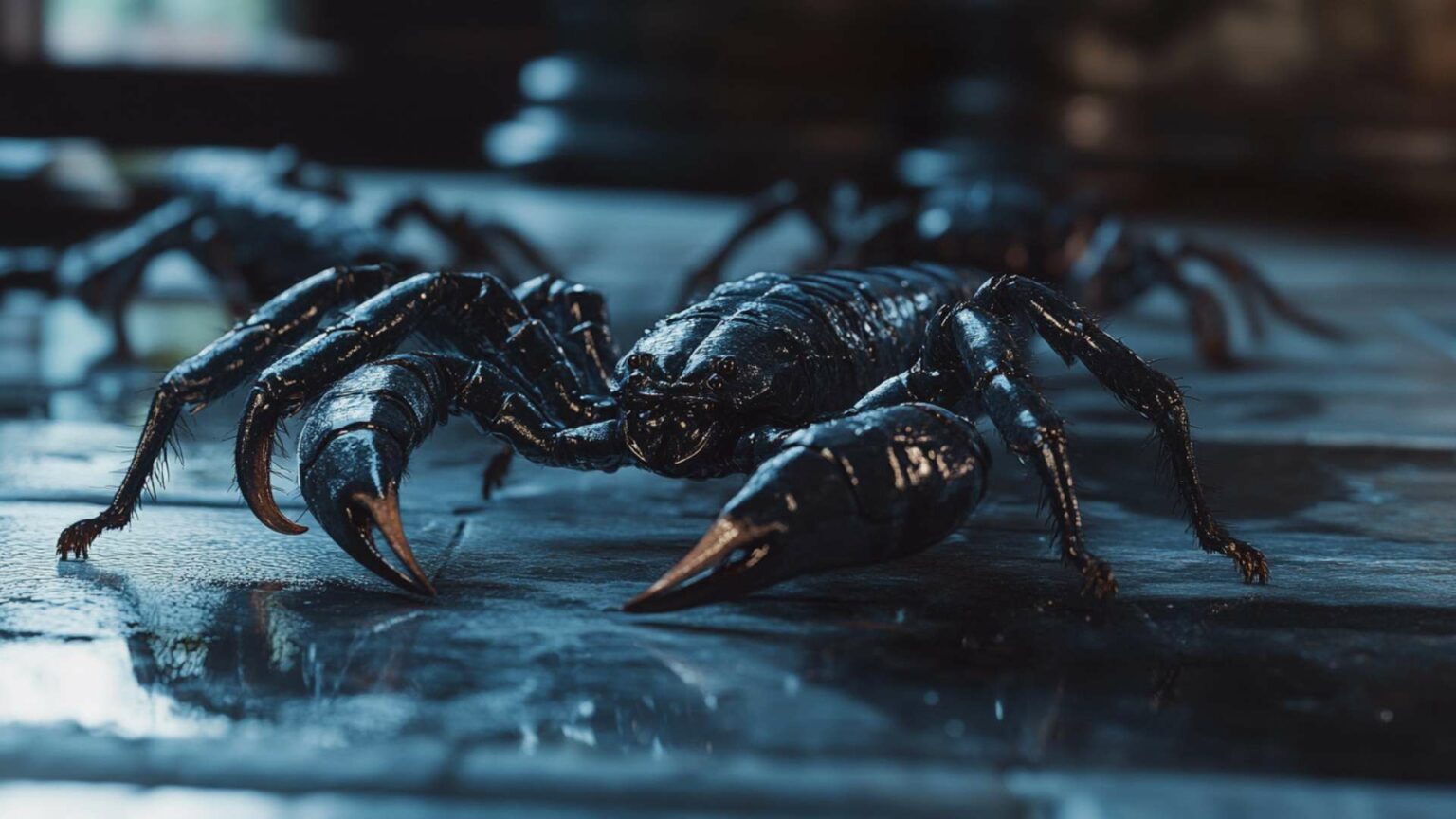The Mysterious World of Scorpions in Las Vegas
A Brief Encounter with Arachnids
Scorpions, those enigmatic creatures of the night, belong to the class Arachnida, which also includes spiders, ticks, and mites among other bugs. With their eight legs, menacing pincers, and barbed tails that can deliver a painful sting, scorpions are fascinating yet often misunderstood creatures. In Las Vegas, a city known for its bright lights and bustling entertainment scene, it might come as a surprise that scorpions thrive in the arid desert environment surrounding the city.
Unveiling the Prevalence
Nestled amidst the vast Mojave Desert, Las Vegas provides an ideal habitat for various species of scorpions. Among them is one notorious villain – the bark scorpion (Centruroides spp.), whose sting is feared by many.
Although Las Vegas is not exclusively home to this striped tree bark and scorpion – they can be found throughout southern Nevada – their presence is more prevalent in this vibrant city due to its rapid urban expansion into desert territories. Scorpion encounters are not uncommon in residential areas close to open desert landscapes.
Their preference for warm climates and arid regions makes Las Vegas an attractive haven for these arachnids. Their ability to adapt and survive in such harsh environments has allowed them to establish stable populations within suburban communities where they seek shelter in crevices or hide beneath rocks during daylight hours.
Facing Challenges: Scorpion Control
While some people may find fascination in observing these nocturnal hunters from a distance or even keeping them as pets within controlled environments, most homeowners consider any encounter with these venomous creatures unwanted. The fear of a bark scorpion sting or severe pain from any other venomous scorpion’s sting often prompts residents to seek ways of keeping them at bay.
Pest control companies in Las Vegas offer various methods to combat scorpion infestations, including installing door sweeps, sealing cracks in foundations, and removing potential scorpion hiding spots. However, it is essential to note that scorpions are an integral part of the desert ecosystem and play a vital role in keeping the population of other insects, such as spiders and pests, in check.
As we delve deeper into the world of scorpions found in Las Vegas, we unravel their mysteries and explore the unique characteristics of each species. From the venomous bark scorpion’s sting to the fascinating adaptations of desert hairy scorpions – our journey will both inform and captivate as we navigate through the realm of these ancient arachnids.
Common Scorpion Species Found in Las Vegas
Arizona Bark Scorpion (Centruroides sculpturatus)

The Arizona Bark Scorpion, scientifically known as Centruroides sculpturatus, is the most common scorpion species found in Las Vegas. These nocturnal arachnids are well-adapted to the desert environment and can grow up to around three inches long.
They have a slender body with long, thin pincers and eight-jointed legs for mobility. One of the distinguishing features of the Arizona Bark Scorpion is its light tan to olive green coloration.
This helps prevent scorpions because it blends in with their surroundings and provides camouflage against potential predators. Additionally, this scorpion has a distinct pair of dark stripes on its back, which makes it easily recognizable.
The venom of an Arizona Bark Scorpion sting can pose health risks to humans. Although most healthy adults will experience intense pain after being stung, severe reactions are relatively rare and typically occur in children or individuals who are allergic to the venom.
It’s essential to seek medical attention if you suspect you’ve been stung by one of these dangerous scorpions. Arizona Bark Scorpions prefer living in crevices and rocky areas where they can find shelter during the day.
They are also known for climbing walls and ceilings, which allows them access into homes or other structures through small openings. Taking preventive pest control measures such as sealing cracks, installing door sweeps, and removing brush around your Las Vegas property can help minimize encounters with these common species.
Desert Hairy Scorpion (Hadrurus arizonensis)

Another notable scorpion species found in Las Vegas is the Desert Hairy Scorpion, scientifically known as Hadrurus arizonensis. These arachnids display unique characteristics that set them apart from other common scorpions found in the area.
The Desert Hairy Scorpion derives its name from the dense, dark hairs covering its body. These hairs serve various purposes, acting as sensory structures to detect vibrations and providing insulation against temperature variations in the desert.
While they may appear intimidating, these scorpions are not as dangerous to humans as the Arizona Bark Scorpion. The venom of a Desert Hairy Scorpion sting is generally mild to moderate in potency for most individuals.
It typically causes localized pain and swelling, but severe reactions are rare. However, it’s important to note that individual sensitivity can vary.
Desert Hairy Scorpions inhabit a wide range of habitats across Las Vegas and its surrounding areas. They are commonly found in sandy soils or desert dunes, where they construct burrows to seek shelter during the day and emerge at night to hunt for prey.
Their ability to withstand extreme arid conditions demonstrates their remarkable adaptations to survive in the desert ecosystem. Las Vegas is home to several species of scorpions, with the Arizona Bark Scorpion being the most common species, and potentially dangerous species encountered by residents.
The distinctive physical features of both the Arizona Bark Scorpion and Desert Hairy Scorpion contribute to their survival in harsh desert environments. While encounters with scorpions can be concerning, taking appropriate precautions such as scorpion control measures and being aware of their habitat preferences can help mitigate potential risks associated with these fascinating arachnids.
Lesser-Known Scorpion Species in Las Vegas
Stripe-Tailed Scorpion (Paravaejovis spinigerus)

The Stripe-Tailed Scorpion, scientifically known as Paravaejovis spinigerus, is a fascinating species found in the Las Vegas area. This scorpion gets its name from its distinctive striped tail pattern, which sets it apart from other scorpions in the region.
In addition to the stripes, it possesses a slender body with reddish-brown coloration and well-developed pincers. While its venom is not considered highly dangerous to humans, caution should still be exercised as reactions to stings can vary.
When comparing venom strength among scorpions in Las Vegas, the Stripe-Tailed Scorpion falls into the middle range. While it may not possess the potency of some scorpions found in other species like the Arizona Bark Scorpion, it’s still important to take necessary precautions when encountering one.
Despite its relatively weak venom, some individuals may experience discomfort and localized swelling if stung. It’s worth noting that severe allergic reactions are rare but can occur in sensitive individuals.
The preferred habitats for Stripe-Tailed Scorpions include desert areas with sandy soil and sparse vegetation. They often seek shelter under rocks or logs during daylight hours and become active at night when temperatures cool down.
Their behavioral traits reflect those of typical scorpions: they are nocturnal hunters that feed on small insects and arachnids. To minimize encounters with this species or any other scorpions in your vicinity, ensure that outdoor surroundings are free of debris and remove brush piles where they might seek shelter.
Giant Hairy Desert Scorpion (Hadrurus spadix)

The Giant Hairy Desert Scorpion is a captivating sight to behold among the scorpions found in the Las Vegas area due to its impressive size. Compared to other scorpion species in the region, the Giant Hairy Desert Scorpion can reach lengths of up to six to eight inches across, making it one of the largest scorpions found in North America. Its size alone makes it a notable presence.
Apart from its size, this scorpion possesses unique characteristics such as large pincers and a hairy appearance. The large pincers aid emperor scorpions in capturing prey and defending against potential threats.
Meanwhile, its hairy exoskeleton serves as an adaptation for moisture retention in the arid desert environment it inhabits. In terms of ecological role and behavior, the Giant Hairy Desert Scorpion plays an important part in balancing the local ecosystem as an efficient predator.
It primarily feeds on insects like beetles and spiders, helping control their populations naturally. Additionally, these scorpions exhibit interesting behaviors such as burrowing into loose soil during extreme temperature conditions to regulate their body temperature and minimize water loss.
Uncommon or Rarely Encountered Scorpions in Las Vegas
Northern Desert Hairy Scorpion (Hadrurus spadix)

The Northern Desert Hairy Scorpion is a less commonly encountered species among Las Vegas scorpions but is still worth mentioning due to its distinct physical characteristics. This species showcases a robust body that can measure up to four inches long, making it larger than many other local scorpions.
Its coloration ranges from yellowish-brown to dark brown. Regarding habitat preferences, the Northern Desert Hairy Scorpion favors sandy terrains with sparse vegetation like its counterparts.
These arachnids typically seek shelter under rocks or within burrows during daylight hours and venture out at night for hunting purposes. Similar to other scorpion species found in Las Vegas, the venom potency of the Northern Desert Hairy Scorpion can cause mild discomfort if stung but is generally not considered dangerous for humans.
If stung, it is advisable to clean the sting area and apply basic first aid measures. However, medical attention should be sought if an individual experiences severe symptoms or exhibits signs of an allergic reaction.
Yellow Ground Scorpion (Vaejovis confusus)

The Yellow Ground Scorpion, scientifically known as Vaejovis confusus, is another rarely encountered species in the Las Vegas area. This scorpion stands out due to its unique yellow coloration and relatively small size compared to most other scorpions and local scorpions. Its coloration acts as a form of camouflage within its desert habitat.
While further research on the venom potency of the Yellow Ground Scorpion is needed, it’s generally considered most scorpions to have weak venom that poses little threat to humans. However, as with any scorpion encounter, caution should still be exercised to prevent stings and potential allergic reactions in sensitive individuals.
Exploring the diverse range of scorpions found in Las Vegas reveals a world of fascinating adaptations and behaviors. While some species attract scorpions like the Stripe-Tailed Scorpion possess distinctive physical features and moderate venom potency, others like the Giant Hairy Desert Scorpion stand out due to their impressive size and ecological roles.
Although uncommonly encountered, species such as the Northern Desert Hairy Scorpion and Yellow Ground Scorpion add further intrigue to this mysterious arachnid world. Remember that while these creatures may evoke caution and respect, they play an essential role in maintaining natural balance within their desert habitats.
Triumph Over Scorpions with D-Termination: Las Vegas’ Top-Notch Pest Control Solution!

Anxious about scorpions lurking in your Las Vegas property? Leave your concerns behind, as D-Termination is here to assist you. Our team of skilled professionals is dedicated to eradicating these venomous pests and restoring the security of your space. Bid farewell to worries about scorpions—opt for D-Termination’s effective pest control services today!
Reach out to us at 702-919-6310 or visit dtermination.com to schedule your scorpion control service and regain control over your space by defeating these unsettling pests.
Frequently Asked Questions:
Yes, there are venomous scorpions in Las Vegas.
Scorpions are fairly common in Las Vegas, especially in desert areas.
The most common scorpions in Las Vegas include the desert hairy scorpion and the bark scorpion.
Scorpions tend to become active in Las Vegas during the warmer months, from spring to fall.







